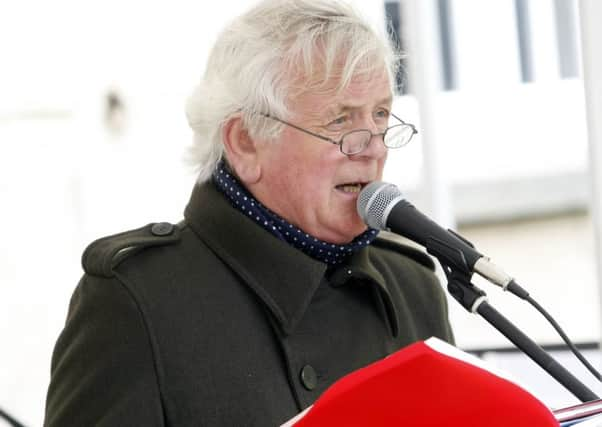Wilson Burgess issues stark Scots prognosis as we toast Robbie Burns


Mr Burgess, whose work in Scots has been published multiple times and is a regular speaker at poetry readings around the country, says he has noticed fewer and fewer people appear to be conversant, let alone fluent in the rich dialect, which has been spoken for generations from Antrim to East Donegal.
In a letter published in several regional papers this week, Mr Burgess, wrote that it was time to stop kidding ourselves and accept that the language is on the verge of extinction.
Advertisement
Hide AdAdvertisement
Hide AdHe told the Sentinel he wasn’t scare-mongering, but stating things as they really are.


“It sounded pessimistic but, in fact, I was telling a truth because as far as I’m concerned, I’ve read from Dundalk to Drumquin, and I’ve read from Aghadowey to Ardara, and there’s no question about it, there are little pockets of people speaking Ulster Scots but generally-speaking people do not, you know, speak this language.”
He added: “There are little pockets in places like North Antrim and our own area, Aghadowey, which used to be a very prominent place for us and recently, I’ve noticed, people have moved in and the language has just diminished and as I’ve said before it’s just little pockets of this and to try and purport that there’s a general surge in the language is wrong. I just think that it’s not right.”
This has been borne out in this area before. Back in 2012, for example, a survey of Londonderry secondary school pupils revealed no-one from a Protestant background could read or speak Ulster Scots even though some of their family members could.
Advertisement
Hide AdAdvertisement
Hide AdThree years on Mr Burgess says this has very much been his experience on the ground.


“People don’t know what I’m talking about when I talk about it here in the city and even the surrounding districts, they just don’t understand it, and I would have to explain it almost. I would need a glossary, sometimes, to explain the words that are being used.”
Mr Burgess says the Ulster Scots Agency (USA) needs to do more to support the language itself without branching out into other manifestations of culture.
That, he says, should be its primary objective.
“I’m really disappointed in what [the Ulster Scots Agency] have done about this and I feel that they have failed to put forward, or given it [the language] as much weight or given it as much backing and promotion.
Advertisement
Hide AdAdvertisement
Hide Ad“I mean, I know lots of excellent writers. I could name them but I’m not going to, but I can at the time, if it’s ever necessary, who, in fact, write in the Ulster Scots dialect, excellent writers and I think that they have been ignored.
“Now I’m not talking about myself. I’ve been backed by the Ulster Scots Agency, so I’ve nothing really bad to say about them from that point of view but other people have not been given, I think, the stage that they should have been, and I think they have failed to do that.
“They have put their talents to other things like marching bands and, as I say, Highland Jacobean dancing, and I just wonder is that one of the things that should have been on their agenda.
“I’m disappointed in what they have done and think that they could have done more and should be doing more than they are at the present time.”
Advertisement
Hide AdAdvertisement
Hide AdIn response to Mr Burgess’ critique, Ian Crozier, the Chief Executive of the Ulster Scots Agency, stated: “It was saddening to read the recent letter from Wilson Burgess attacking Ulster-Scots as a dead language, but his assertion that Ulster-Scots is dead is just dead wrong.
“Interest in Ulster-Scots is growing all the time, in schools and community groups all over Ulster. At the last census in 2011, more than 140,000 people (about eight per cent of the population) indicated that they could speak, read or write in Ulster-Scots. Just a year later, the Continuous Household Survey found the figure had almost doubled, to 14 per cent of the population.
“This is not the sign of a dead language, but rather one which is undergoing a revival.
“Wilson accuses the Ulster-Scots Agency of merely paying lip service to the language and taking refuge in safe alternative culture.
Advertisement
Hide AdAdvertisement
Hide Ad“There are two important points here. First, the Ulster-Scots Agency’s statutory role is to promote Ulster-Scots language, heritage and culture. “These things are not in competition, they complement and support each other. Second, far from paying lip service, the Ulster-Scots Agency has been praised for its efforts in respect of the language. In its most recent report, the European Committee of Experts (COMEX) which oversees the development of minority languages across Europe, observed that “the position of Ulster-Scots has improved since the last monitoring round, thanks largely to the work of the Ulster-Scots Agency.”
“As part of our effort to promote the language, the Agency has made Burns Night a highlight of Northern Ireland’s cultural calendar (our concert with the Ulster Orchestra filled the Waterfront Hall last year and reached a television audience of 36,000); we are building links with Scotland around Burns (our exhibition on Burns in Ulster was displayed throughout 2015 at the Burns Museum in Dumfries); and our most recent publication, Scotch Town: Ulster-Scots Language and Literature in Belfast, has been extremely well received.
“The very fact that Wilson has spent years writing in Ulster-Scots (and has had two books of poetry published and paid for by the Ulster-Scots Agency) shows that the language is not dead. Perhaps it is less a question of carrying food to the grave and more a question of eaten bread is soon forgotten.”